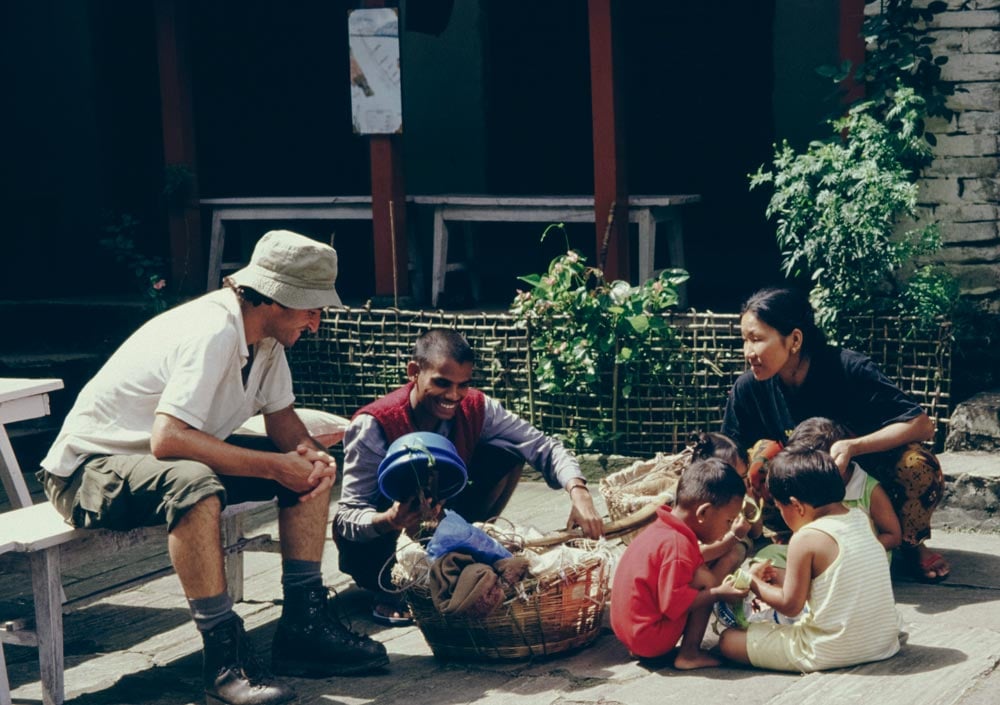Why Humility is So Important in Missions: Practicing Mutuality, Accuracy, and Service in Foreign Lands and in the Mission Organization
Organizational Value: Humility
June 04, 2025
It is so much easier to write and talk about humility than it is to become humble. It reminds me of the classic children’s book, “Going on a Bear Hunt,” by Michael Rosen. Any obstacle the children and their parents face in this book begins with a rousing rendition of
You can’t go around it...
You can’t go over it...
You can’t go under it...
You gotta go through it...
There is no going around, jumping over, or digging under to become humble. It is a walk through a valley that is often painful, if for no other reason than to strip away the pride you weren’t aware was there.
This growth requires a constant awareness of the life going on within and around us. We can’t run away (though we often try), and we frequently cannot resist how inclined we are to fight. Regardless, our walk with Jesus and growing in humility means we cannot go around, under, or over, but we must go through.
Matthew 8:1-4 tells us the story of the leper who sought Jesus for healing right after the Sermon on the Mount.
When he came down from the mountain, great crowds followed him. And behold, a leper came to him and knelt before him, saying, “Lord, if you will, you can make me clean.” And Jesus stretched out his hand and touched him, saying, “I will; be clean.” And immediately his leprosy was cleansed. And Jesus said to him, “See that you say nothing to anyone, but go, show yourself to the priest and offer the gift that Moses commanded, for a proof to them.
From the leper’s view, what do you see the leper doing and saying? What cultural rules are being followed or broken? What does the leper want?
From Jesus’ view, what do you see Jesus doing and saying? What cultural rules is Jesus following? What societal rules are being broken? What does Jesus want to communicate to the leper?
If you have studied lepers in ancient times, even a little bit, you know that they were outcasts. There was tremendous fear around a leper’s illness, and with good reason. It had to be isolated to be contained. So, the law required that lepers reside outside the city gates while they were considered unclean. If they were healed, Leviticus 14 shows how the law required them to come before the priest. The priest would examine them and then declare the leper clean. This declaration by the priest would begin a 2-week ritual of cleansing before returning to their community.
The leper in Matthew 8 knew Jesus could help him, but he still had to ask Jesus, “If you will,” other translations say, “If you want to.” I find this statement alarming and full of faith. He knows Jesus could heal him, but did He want to? It is much more lovely to receive help when people want to help you. People didn’t want to help lepers; they wanted to stay away, to stay clean, and to avoid getting sick. So, I can only imagine it meant that many lepers would go a long time without a hug, a handhold, a handshake, anything that meant skin contact could occur.

The leper wanted Jesus to want to heal him, and he understood Jesus could say, “No,” or “I don’t want to.” What if Jesus didn’t want to? The leper was certainly willing to take the risk. It had now become worth whatever more losses he may incur to move toward Jesus and ask for His healing. Surely there was a crowd surrounding Jesus when He finished the Sermon on the Mount. What was it like for this leper to make his way through the crowd to enter Jesus’ presence? I imagine there was some good death glares that came his way.
I see such beauty here, especially in Jesus’ response. “I want to,” or “I will,” is so powerful, so dignified, so affirming. Jesus wanted to heal the leper. He saw the leper as the human that he was, and He wanted to restore the leper’s health. More than that, He had the power to make it happen, and so He did. This was not simply a healing that would take place on his skin; the leper was given further instructions. He still needed to go before the priest and then perform the cleansing ritual.
At Global Outreach International (Global), we have spent intentional time considering what humility looks like as an organization, and we have landed on a few key principles. We see humility through mutuality, accuracy, and service.
First, Allow Me to Introduce Micah
I worked as a home health nurse starting in 2019. My first patient was an 8-year-old boy named Micah. He was a delight for me to work with. His demeanor was cheerful, and he laughed often.
As a newborn, Micah survived on life support. A heart defect was discovered, and the condition was so severe, it led to a brain bleed that caused cerebral palsy.
It was unknown whether, if he did live, if he would ever be able to walk or speak. Micah was the youngest in a family of 7 children. Fortunately, the other children were physically healthy, however this event upended all previous notions of what a well-lived life meant for the whole family.
What they could manage on their own before Micah’s birth was now impossible. His parents became very aware that they would not be able to care for their family’s needs without more help. Regular doctor visits, hospital visits and long-term stays, nursing care, and physical therapy in the home would all be a part of their new routine.
Micah would need full-time nursing care for his lifetime. I had never taken care of a person with his needs, so I had a lot to learn.
Humility is Mutuality
Global is a member of Missio Nexus, an organization that provides education and resources on the world of missions for missions organizations. Ted Esler, the president of Missio Nexus, has been exploring the idea of mutuality in missions. He states, “Mutuality is a realization that the imago dei (image of God) exists in all people, including those to whom God sends us. They are not the subjects of our ministry's efforts. Instead, we must empty ourselves, take on the form of a servant, and truly value them as not just equals, but as those we serve. This is a radical ‘with/under’ and not a ‘to/over.’”
If the missionary enters the field with a learning mindset, they will be more resilient to the challenges of adjusting to a new culture. However, the default ways of operating in their world will still be challenged. The missionary arrives to learn so they can care for the people. The ideal is to be able to love the people they are serving in a way that can be most easily received. While many human needs are universal, they are often expressed and received in a large variety of ways. If we want people to feel loved, we must know how they best receive it.

For example, Jesus leaned toward the leper and even touched him.
Let’s go back and visit Micah.
Eight years after he was born, I started taking care of Micah. I immediately knew his mom, Carrie, understood more about his condition and needs than anyone else, even Micah’s medical team. His personalized mixture of infant formula, physical therapy exercises, how the family interacted with him, schedule of medications, and feeding times were all focused on his specific needs.
It quickly became clear that I was not there only to follow a prescribed schedule, but I needed to get to learn Micah myself. I needed to get to know this child who could not speak to me, who could not grab my hand and show me what he wanted, who relied on his family and home nurses, which now included me, to meet his needs.
Carrie relied on my nursing training to catch on quickly. I relied on her experience with Micah and his medical team to get up to speed. She understood how to stretch his muscles and if he was experiencing pain. She was familiar with the specific equipment he used. She and her husband, Chris, knew how they wanted to care for him.
Just because I was a nurse didn’t mean I knew how to take care of Micah.
Just because we are believers doesn’t mean we land in a foreign country and know how to share the greatest news so the people will respond.
We must get to know the people we serve and learn from them. We must learn their language. We must learn what motivates them. We must understand when they feel cared for, what makes them hurt, and how they belong to their society. We must spend time with them.
Humility is Accuracy
If we are accurate about who God is and who we are, if we are in line with what God says about who He is and who He says we are, the only appropriate response is humility.
Humans are needy creatures. We have very specific standards just to survive on Earth. If we were a mile closer or a mile farther from the sun, we would either burn alive or freeze to death. If our body temperature goes up one degree, it can lay us down for several days while our body fights off disease. A 15-year-old football player who is still growing requires seemingly infinite calories to meet the demands in front of him in order to remain healthy and resilient on the field. These are only our physical needs.
Another human need is strong, well-connected relationships. Research does indicate that meaningful relationships are strongly connected to physical health. If we do not experience trusting, safe, empathic relationships, chances are high that our physical well-being will not look so well and may lead to premature death.
Humans are needy creatures. We need the environment, our sustenance, and our relationships to be in good working order for us to flourish.

Is it difficult to ask for help? I have found it quite difficult to ask for help on many occasions. Many of us live with this malady that we must bear all our problems on our own. A children’s book comes to my rescue again here. Charlie Mackesy’s The Boy, The Mole, The Fox, and the Horse is a gem. Everyone should own a copy. In the middle of the book, the boy and the horse have an important conversation,
“‘What is the bravest thing you’ve ever said?’ asked the boy. ‘Help,’ said the horse.
“When have you been at your strongest?’ asked the boy. ‘When I have dared to show my weakness.’ [says the horse]
“Asking for help isn’t giving up.’ said the horse. ‘It’s refusing to give up.’”
The other side of accuracy recognizes gifting. One of those gifts is our body. While all of our bodies are decaying, they are marvelous gifts that provide enormous amounts of ability. When God finished with creation, He called it good. When He made man and woman, He said it is very good. That still holds true. Our bodies are a gift and treating them as a gift is an act of honoring God and His provision.
We are also given unique gifts that come in the form of desires, abilities, education, skills, training, etc., that allow us to contribute to society and to the body of Christ.
Imagine if C.S. Lewis and J.R.R. Tolkien had not studied history and loved reading, or if Thomas Edison had never pursued his light bulb invention. Farmers, homemakers, educators, pilots, engineers, musicians all use a combination of their God given desires, talents, education, and practice to bring order, beauty, and abundance to our world. If they were not accurate about their desires and abilities, we wouldn’t have their gifts to enjoy.
When we are accurate about our weaknesses and our strengths, it places us on the road to growing in humility.
When I reflect on my time taking care of Micah, I remember a gift he possessed that brought so much beauty. His brothers and sisters would bring in dancing stuffed animals that had blinking lights and a silly song. A sibling would place it on the tray in front of him and flip the switch so the animal would dance, the song would play, and the lights would flash brightly. As the music began, I discovered Micah had the heartiest, sincerest belly laugh ever. I would always feel my heart lift and a chuckle slip out of my mouth. His laugh was a reward I could not have conjured up in my mind. He gave laughter, a connection to one another, and relief from all the difficulties he bore. The heaviness we all felt for him was momentarily forgotten because of him.
Humility is Service
We know Jesus was tired after His teaching at the Sermon on the Mount. It would have made sense for him to retire to a quiet place to rest after a long day of teaching. But Jesus wasn’t ready quite yet. He reveals something deeply transformative: humility in action is divine service — it touches what others avoid, heals without seeking honor, and restores dignity in silence.
He stood with the leper in the crowd. He listened to his request, looked him in the eyes. He heard, “if you want to,” and He cared for this hurting man.
Jesus reached out to touch him and leaned toward the leper. I wonder how long it had been since someone had leaned toward him. I wonder how often people stepped back, ran away, screamed, shuddered, or insulted him in their fear. I imagine that most stayed as far away as possible.
But Jesus said, “I want to [heal you].” He wanted to. He didn’t have to. He wasn’t told to. Jesus wanted to make this man clean. What sweet words. How long had the leper yearned to hear them.
When we serve in humility — quietly, sacrificially, without needing reward — we imitate Christ. We touch the “leper” in our world: the rejected, the lonely, the outcast, the ashamed. We don’t do this to prove we’re good — but because we see the divine in those the world avoids, the imago dei.
Jesus gave the man further instructions so see the priest and to do the cleansing rituals found in Leviticus 14. After two weeks, he would be able to rejoin his community.
This is not only the healing of a physical ailment, but also the restoration of relationships. We don’t know if he had a family or if he was married. We do know he was able to join his community and be part of it again. Friendships and neighbors, gatherings and parties, he could be a part of all of it again. He asked, and Jesus wanted to, and declared the leper clean.

Jesus poured himself out for this man, even when He was tired.
Philippians tells us that Jesus gave himself over to death. Most of us will not be asked to die on a cross, but we will face death. We will feel poured out and drained. We will be exhausted, we will feel defeated, and sometimes hopeless. If we dare show our weakness and step out of the way for Jesus to work through it, we may find ourselves in His presence.
The Reality of Humility
Humility is more robust than quietly submitting. It may not be quiet at all. When seen through the lens of mutuality, accuracy, and service, we can see humility as an act of worship.
While I helped care for Micah, I watched a family who cared tenderly and consistently for him. They met the challenges placed before them. In her walk with the Lord, Micah’s mother came before Jesus while her baby was being kept alive by machines and confessed, “If he can laugh, I can do this.” Friends, this mother and father advocated for their son, and they cared well for him. Micah was very much part of the family and part of their lives.
I showed up for my shift one morning in June at their home. Emergency vehicles covered the front of their home. I entered their front door and greeted Micah’s siblings, whose faces were splotchy and tear-stained. It took a moment for me to understand that Micah took his last breath during the night. As the emergency personnel finished their duties and exited, Carrie repeated to her children “Micah is healed. He is now singing and jumping and playing and talking. He is with Jesus, and he is whole.” The tears raced down her cheeks in her grief, and the repetitions of Micah’s healing continued.
She had been asking the Lord for Micah’s healing.
Indeed, his healing had been granted.
Though it was not in the way she had imagined or hoped, it was true.
She clung to that truth with all of her might.
She was now asked to do some extremely difficult work.
She was asked to grieve the loss of her child. She knew Jesus would walk with her through it, but this would change her daily life in many ways.
Like the leper, Jesus heard Carrie. He listened and even drew close to her. He also gave her work to do.
The reality is that growing in humility will take everything out of you, but you are not alone. Jesus walks with you, he listens to your pleas, he leans in and touches you to heal, and will show you the next step.
Reference
Rosen, Michael. (2015). We’re Going on a Bear Hunt. Walker Books Ltd.
Missio Nexus, Ted Eislinger; president Missio Nexus. MissioNexus.org
Mackesy, Charlie. (2019). The Boy, The Mole, The Fox, and the Horse. Harper One.
Wolgemoth-DeMoss, Nancy. Revive Our Hearts. Don’t Waste Your Pain. Listen to Micah’s Story here.
The Health Benefits of Strong Relationships - Harvard Health



